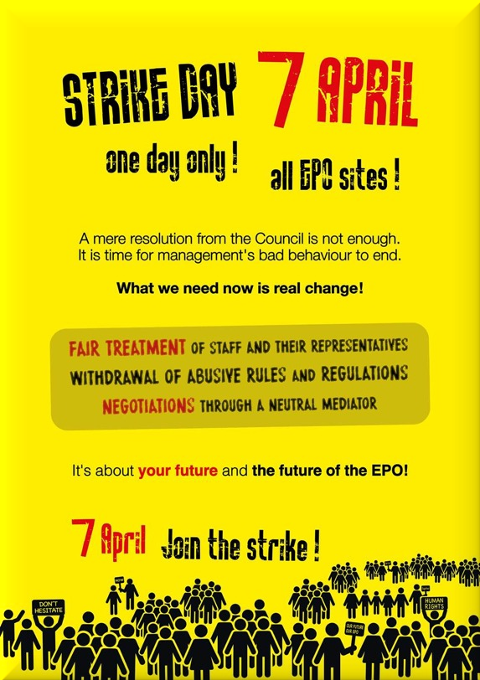

THIS was inevitably going to happen. The staff has had enough and it won't tolerate it without sending out a strong message. For some context and background on this we suggest the following older articles of ours (sorted chronologically):
One-day Office-wide strike on 7 April 2016
No essential progress has been made on staff’s claims as expressed in the call for strike entitled “Lawfulness at the EPO” that was sent to the President on 10 February 2016. The initiators of the call for strike have informed the CSC that they would like the strike to happen at the earliest opportunity. Accordingly, the strike shall take place on 7 April 2016 at all sites of employment: Munich, The Hague, Berlin and Vienna.
"The AC, [...] having repeatedly expressed its deep concerns about the social unrest within the EPOffice; having repeatedly urged the EPOffice President and the trade unions to reach a consensus on an MOU which would establish a framework for negotiation between social partners; noting that disciplinary sanctions and proceedings against staff or trade union representatives have, among other reasons, made it more difficult to reach such a consensus; noting that these disciplinary sanctions and proceedings are widely being questioned in the public opinion; recalling the importance and the urgency of the structural reform of the BOA; recognizing the important institutional role of the AC and its dependence on a well-resourced and independent secretariat; Calls on both parties to the social dialogue to recognize their responsibilities and to work diligently and in good faith to find a way forward, and: Requests the EPOffice President - to ensure that disciplinary sanctions and proceedings are not only fair but also seen to be so, and to consider the possibility of involvement of an external reviewer or of arbitration or mediation pending the outcome of this process and before further decisions in disciplinary cases are taken, to inform the AC in appropriate detail and make proposals that enhance confidence in fair and reasonable proceedings and sanctions; to submit to the AC a draft revision of the Staff Regulations which incorporates investigation guidelines (including the investigation unit) and disciplinary procedures which have been reviewed and amended; to achieve, within the framework of the tripartite negotiations, an MOU simultaneously with both trade unions, which would have no pre-conditions or exclude any topics from future discussions; to submit proposals to the AC at its June 2016 meeting, after discussion in B28, for immediate implementation of the structural reform of the BOA, on the lines of the 5 points agreed by the AC at its December 2015 meeting and of the legal advice given by Prof. Sarooshi, and taking into account comments from the Presidium of the BOA; to submit proposals to the AC at its June 2016 meeting, after discussion in B28, for reinforcement of the AC secretariat and a clarification of its position in terms of governance. Requests the staff representation and the Trade Unions – to acknowledge the importance of firm and fair disciplinary procedures; and to respond constructively to the initiatives set out above, in particular to work rapidly to an agreement on Union recognition without preconditions."
Sounds like the AC did not have a clue of what was going on, did they? Supervisory body? European model institution? Frightening ...
Yours, AC-DC
In the UPC, the risk of a pan-European injunction increases these considerations. Tina suggested that a concept of an automatic one-size fits all injunction can distort how companies do business. Indeed, a concept of an automatic injunction may prioritize litigation over licensing.
Annabelle Bennett, in the audience, commented that the patent is the right to exclude: "Previously, in the ordinary patent sense, people would come to court and almost automatically be granted an injunction. But, an injunction is a discretionary remedy which means you do not get an injunction in all cases. Standard essential patents (SEPs) are a classic example or where a device has 1000 patents in it. Judges are not automatons - they will fashion the remedy to the case." This will hopefully also ring true in the UPC, says Merpel.